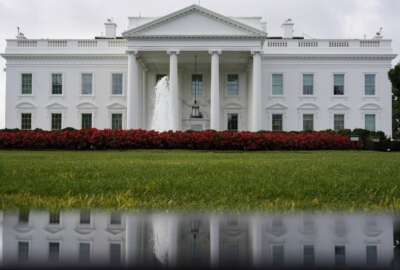Air Force embeds recruiters in flyover country to find new cadets
In today's Federal Newscast: Microsoft will soon give it away for the sake of cybersecurity. The Office of Personnel Management is drafting new qualification st...
- A pay raise for frontline Border Patrol employees is one step closer to reality. The Senate Homeland Security and Governmental Affairs Committee advanced the Border Patrol Enhancement Act and it is now headed for a full Senate vote. The bill would give GS-12 Border Patrol agents a minimum 14% pay raise. It would also give the Department of Homeland Security the authority to set higher pay for other Border Patrol agents. The bill’s sponsor, Sen. James Lankford (R-Okla.), said frontline Border Patrol agents are working up to 100 hours per pay period, but are not earning overtime. "This is a paid change that is long overdue for Border Patrol," Lankford said.
(Senate committee OKs Border Patrol pay raise, CBP hiring, permanent federal firefighter raise bills - Federal News Network)
- Federal wildland firefighters got a big, but temporary pay raise in the Bipartisan Infrastructure Law. Now a bill is moving through the Senate to make it permanent. The Senate Homeland Security and Governmental Affairs Committee approved the Wildland Firefighter Paycheck Protection Act, which would keep in place a $20,000 pay raise. That's a 50% increase. About 18,000 federal wildland firefighters are covered by the pay raise. The National Federation of Federal Employees warns many firefighters will leave federal service if Congress lets the pay raise lapse in September. (Senate committee OKs Border Patrol pay raise, CBP hiring, permanent federal firefighter raise bills - Federal News Network)
- The Ninth Air Force Command will partner with George Mason University to perform research-and-capability development to support the command's mission. The partnership will include applied research-and-development programs with the engineering school's national security and defense teams, along with digital transformation efforts. Air Force personnel will have access to specialized graduate and Ph.D. programs offered through Mason’s School of Business and the College of Engineering and Computing. The teams will work on projects involving cyber security, sensor fusion, predictive analytics and accelerating digital capabilities.
- After months of negotiations, the ink is almost dry on a new collective bargaining agreement at the Social Security Administration (SSA). Updates to employee training, child and elder care, telework eligibility and much more are close to finalized for SSA staff. The agency reached a tentative agreement with the American Federation of Government Employees (AFGE). The updates to six contract provisions come after years of warnings from AFGE about staff attrition, poor work-life balance and unmanageable workloads at SSA. The contract changes will take effect after bargaining unit ratification and an agency sign-off, and will stay intact until October 2029.(Telework, agency funding still an ‘uphill battle’ after SSA, AFGE reach tentative agreement - Federal News Network)
- The Air Force Academy has special resources in place to make sure prospective cadets in rural areas get opportunities to apply to the academy. At a House Armed Services Committee hearing, Lt. Gen. Richard Clark said the academy added outreach for areas that don't have reliable internet access or proximity to recruiting events. He said the academy has designated so-called "opportunity districts," where Air Force lieutenants are embedded, so they can travel to meet prospective cadets.
- The White House has told agencies to deepen their interactions with the public on some of their most important activities. The White House Office of Information and Regulatory Affairs (OIRA) wants agencies to be more proactive about their communications with the public and communities when developing regulations. A new memo from OIRA laid out a range of steps agencies can take to increase public participation in the regulatory process. Those steps include, broadcasting public engagement opportunities in the Unified Agenda of agency rulemakings, ensuring they gather public input before formally developing regulations, and taking full advantage of exemptions in the Paperwork Reduction Act. (White House to agencies: Be proactive about working with public on regulations - Federal News Network )
- One of the government’s biggest technology vendors said it will offer key cloud security features to its customers for free. In the coming months, Microsoft plans to make a wider range of cloud security logs available at no additional cost. The development comes after the Cybersecurity and Infrastructure Security Agency worked with Microsoft to identify the most critical types of logs needed to spot cyber attacks. The issue came to a head last week when it was revealed a federal agency was only able to spot a suspected Chinese cyber intrusion into its email, because the agency subscribed to Microsoft's premium logging capability.
- The White House wants to make sure all agencies are singing from the same sheet when it comes to cybersecurity rules. The Office of the National Cyber Director yesterday released a Request For Information (RFI) on cybersecurity regulatory harmonization. The goal is to understand challenges with regulatory overlap, and explore a framework for regulators to accept a common set of cyber standards. Responses to the RFI are due by September 15.
- The Office of Personnel Management is drafting out new qualification standards for federal wildland firefighter management jobs. As part of the Infrastructure Investment and Jobs Act, OPM was tasked with creating a new occupational series for wildland firefighters. The goal is to improve retention of the frontline federal workers, who often have unclear steps in their career ladders. The new draft also details minimum qualifications for the position, which OPM said will help agencies find better candidates for the job. The draft position description will remain open to public comment for 30 days. (Draft position qualification standard for wildland fire management - Office of Personnel Management)
Copyright © 2024 Federal News Network. All rights reserved. This website is not intended for users located within the European Economic Area.
Peter Musurlian
Peter Musurlian is a producer at Federal News Network.
Follow @PMusurlianWFED
Related Stories
First Look
Agency Oversight
Read more






